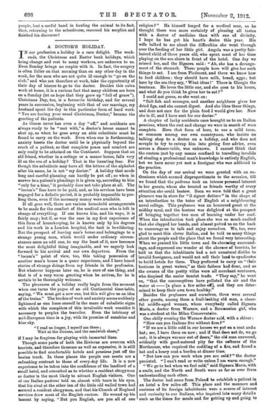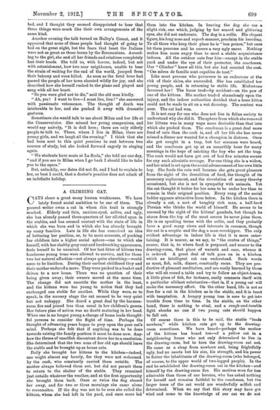A DOCTOR'S HOLIDAY.
TN our profession a holiday is a rare delight. The week-
ends, ends, the Christmas and Easter bank holidays, which bring change and rest to many workers, are unknown to us. Even Sunday brings no respite with it. In fact, the surgery is often fuller on that morning than on any other day in the week, for the men who are not quite ill enough to "go on the club," and who are therefore at work, take the opportunity of their day of leisure to go to the doctor. Besides this extra work at home, it is a curious fact that many children are born on a Sunday (let us hope that they grow up "full of grace "). Christmas Day, too, is a favourite birthday, and for several years in succession, beginning with that of our marriage, my husband spent the day in this particular form of hard work. " You are having your usual Christmas, Doctor," became the greeting of the patients.
As illness never has even a day "off," and accidents are always ready to be "met with," a doctor's house cannot be shut up, so when he goes away an able substitute must be found to carry on the work. Even when one is forthcoming, anxiety besets the doctor until he is physically beyond the reach of a patient, so that complete peace and comfort are only really to be attained on the Continent. Suppose that an old friend, whether in a cottage or a manor house, falls very ill on the eve of a holiday ? That is the haunting fear. For though the substitute may have all the letters of the alphabet after his name, he is not " my doctor." A holiday that needs long and careful planning can hardly be put off ; so when in answer to a patient's pleadings it is given up, according to him "only for a time," it probably does not take place at all. The "locum's" fees have to be paid, and, as his services have been engaged for a definite period, it is probably impossible to pro- long them, even if the necessary money were available.
If all goes well, there are various household arrangements to be made for the comfort of the medical man who is left in charge of everything. If one knows him, and his ways, it is fairly easy; but if, as was the case in my first experience of this form of housekeeping, he is known only by his degrees and his work in a London hospital, the task is bewildering. But the prospect of leaving one's house and belongings to a strange young man, which would under ordinary circum- stances seem an odd one, to say the least of it, now becomes the most delightful thing imaginable, and we eagerly look forward to his arrival and our own departure. From the " locum's " point of view, too, this taking possession of another man's house is a queer experience, and I have heard stories of strange doings from my friends in the profession. But whatever happens later on, he is sure of one thing, and that is of a very warm greeting when he arrives, for he is certain to be thoroughly welcome.
The pleasures of a holiday really begin from the moment when one turns the pages of an old Continental time-table, saying, " We must get a new one, but this will give us an idea of the trains." The burden of work and anxiety seems suddenly lightened as one loses oneself in the maze of cabalistic signs with which the compilers of this invaluable work consider it necessary to perplex the traveller. Even the intricacy of mid-European time is a joy, with its promise of sunshine and blue sky.
"I read no longer, I myself am there ; Wait at the Douane, and the sandwich share," if I may be forgiven for playing with immortal lines. Though some parts of both the Rivieras are overrun with tourists, and therefore tiresome as well as expensive, it is still possible to find comfortable hotels and pensions just off the beaten track. In these places the people one meets are a refreshing contrast to those of every-day life. It is a new experience to be taken into the confidence of the landlord of a small hotel, and consulted as to whether a resident clergyman or doctor is the most likely to attract English visitors. One of our Italian padroni told us, almost with tears in his eyes, that his rival at the other inn of the little old walled town had secured a resident clergyman, and that his Church of England services drew most of the English custom. He wound up his lament by saying, " But you English, are you all of one religion?" He himself longed for a medical man, as he thought there was more certainty of pleasing all tastes with a doctor of medicine than with one of divinity. I hope he has got his heart's desire this year. His wife talked to me about the difficulties she went through over the feeding of her little girl. Angela was a pretty fair- haired child of three years old, who spent most of her time playing on the sea shore in front of the hotel. One day wo missed her, and the Signora said : " Ah, she has a. derange- ment of the stomach. These people here will give her such things to eat. I am from Piedmont. and there we know how to feed children : they should have milk, bread, eggs ; but here by the sea they say, `What ideas!' There is Giorgio the boatman. He loves the little one, and she goes to his house, and what do you think he gives her to eat ?"
I could not guess, so she went on: " Salt fish and sausages, and another neighbour gives her dried figs, and she cannot digest. And she likes these things, and does not care for the plain food I would give her. Now she is ill, and I have sent for our doctor."
A chapter of lucky accidents once brought us to an Italian pensions, where the rest and change we were in search of were complete. Here that form of bore, to use a mild term. so common among our own countrymen, who insists on talking shop to a doctor on a holiday, and who does not scruple to try to entrap him into giving free advice, even across a dinner-table, was unknown. I cannot think that the custom (not by any means confined to travelling invalids of stealing a professional man's knowledge is entirely English, but we have never yet met a foreigner who was addicted to the practice.
On the day of our arrival we were greeted with an en- thusiasm which seemed disproportionate to the occasion, till we found that the padrona took an intense personal interest in her guests, whom she treated as friends worthy of every attention she could bestow. Soon we were told that a great pleasure was in store for " il signor dottore " in the shape of an introduction to the tutor of English at a neighbouring naval college. This professore was an honoured guest at the midday meal, and the hostess was delighted at the prospect of bringing together two men of learning under her roof. When the introduction took place she was so much excited that she clapped her hands, and almost patted us on the back to encourage us to talk and enjoy ourselves. We, too, were glad to meet this clever Italian, and he told us many things about the people and the place that we found very interesting. When we praised his little town and its charming surround- ings, and expressed our wonder at the absence of tourists, he told us that the inhabitants had a not unnatural dislike to invalid foreigners, and would not sell their land to syndicates to build hotels for them. They preferred to carry on " their business in great waters," as their fathers had done, and so the owners of the pretty villas were all merchant venturers, who despised the easier tourist trade. " They say," he went on, "that the consumptives have polluted the air and the water at — [a place a few miles and they are deter- mined to keep their own town healthy."
Besides the professors and ourselves, there were several other guests, among them a frail-looking old man, a cheer- ful middle-aged woman, whom everybody called Signora Maria, a doctor from Warsaw, and a Roumanian girl, who was a student at the Milan Conservatoire.
One chilly evening the Warsaw doctor said, with a shiver : "How can you Italians live without fires?"
"If we are a little cold in our houses we put en a coat and a hat ; see, I have them on now ; and if that does not do, we go out; it is always warmer out of doors," the old man answered, evidently with good-natured pity for the softness of the Northerner, who required the coddling of a fire, and found a hat and a heavy coat a burden at dinner time.
"But how can you work when you are cold ?" the doctor persisted. " I can't read or write unless I am warm enough." " We go to bed when we feel cold," said Signora Maria, with a smile, and the North and South were as far as ever from understanding each other.
The doctor had come from Poland to establish a patient in an hotel a few miles off. This place and the manners and customs of its foreign inhabitants were a source of interest and curiosity to our Italians, who inquired into many details such as the times for meals and for getting up and going to
bed, and I thought they seemed disappointed to hear that these things were much like their own arrangements of the same kind.
Another evening the talk turned on Halley's Comet, and it appeared that none of these people had thought of going to bed on the great night, but the fears that beset the Italians were not as great as those borne by the Roumanians. Accord- ing to the girl, she and all her friends and relations completely lost their heads. She told us, with horror, indeed, but not with astonishment, how two near neighbours, unable to bear the strain of waiting for the end of the world, jumped from their balcony and were killed. As soon as the fatal hour had passed the people of her town shouted wildly for joy, and she described how she herself rushed to the piano and played and sang with all her heart.
" So you were glad not to die," said the old man kindly.
" Ah, yes 1 I want to live—I must live, live !" she answered with passionate vehemence. The thought of death was intolerable to her, and she pushed it away with dramatic gestures.
Sometimes she would talk to me about Milan and her life at the Conservatoire. She missed her young companions, and would say naively, " It is dull here ; there are only elderly people to talk to. There, where I live in Milan, there are young girls, and we laugh all the evening." I think that she had been sent to this quiet pensions to rest between two courses of study, but she looked forward eagerly to singing again.
" We students have seats at La Scala," she told me one day, " and if you are in Milan when I go back I should like to take you to the opera."
But, unluckily, our dates did not fit, and I had to explain to her, as best I could, that a doctor's practice does not admit of an indefinite holiday.



























































 Previous page
Previous page